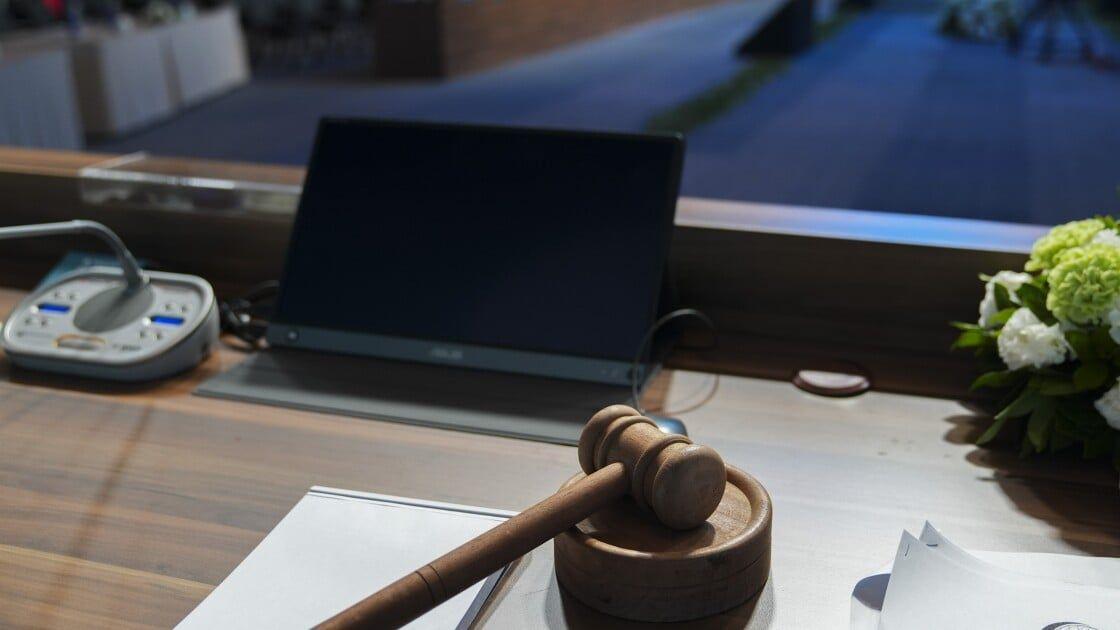Eudia: The AI-Powered Legal Startup Challenging Traditional Law Firms
2 Sources
2 Sources
[1]
Legal AI startup Eudia opens law firm under Arizona program
Sept 3 (Reuters) - Eudia, a venture capital-backed startup that makes an artificial intelligence-powered platform for corporate legal teams, on Wednesday said it has launched a law firm in Arizona under loosened law firm ownership rules. Palo Alto-based Eudia has opened what it called an "AI-augmented" law firm, Eudia Counsel, that will equip lawyers with its technology to serve corporate clients in areas including contracting and merger and acquisition diligence, according to company leaders. The firm is the latest in a growing number of firms and businesses that have been licensed as "alternative business structures" (ABS) in Arizona since 2020, when the state scrapped rules barring non-lawyers from having an economic interest in law firms, allowing co-ownership with court approval. KPMG in February opened a law firm in the state, making it the first of the Big Four accounting firms to be able to practice law in the United States. Axiom, LegalZoom and Elevate are among other large companies that have launched law firm subsidiaries or affiliates under Arizona's loosened rules. Other entities, such as personal injury law firms partially owned by non-lawyers, are among the others that have been approved. The Arizona Supreme Court approved Eudia Counsel LLC's application in June, according to a court order, opens new tab. Eudia, founded in 2023, publicly launched in February with the announcement of a funding round for up to $105 million led by venture capital firm General Catalyst. The company says its platform combines AI with human expertise. Its customers include DHL, Duracell, Cargill, Intuit, Stripe and the U.S. government, the company said. Eudia's law firm subsidiary will serve similar clientele, said David Van Reyk, Eudia's co-founder and chief operating officer. Eudia increasingly sees traditional law firms as competitors, said Omar Haroun, the company's co-founder and chief executive officer. Law firm billing rates continue to climb, and some customers are "a bit frustrated that none of the apparent value that the firms are getting from AI, if they are using it," seems to be passed on to the customer, he said. Arizona is the only U.S. state that has permanently changed law firm ownership rules. Utah relaxed its rules through a pilot program, which the state recently scaled back. Other states, including Washington and Indiana, are on the path to starting similar projects. Reporting by Sara Merken Our Standards: The Thomson Reuters Trust Principles., opens new tab * Suggested Topics: * Legal Industry * Data Privacy Sara Merken Thomson Reuters Sara Merken reports on the business of law, including legal innovation and law firms in New York and nationally.
[2]
Meet the $100m AI startup that wants to kill the billable hour: 'Most legal departments have lost control of their budgets and their knowledge'
The company has fought hard behind the scenes to bring this law firm to light, Haroun said in an interview with Fortune at the company's 2025 Augmented Intelligence Summit in New York. Arizona is the only state in the country where a law firm is not required to be owned by lawyers, he said. Even still, there are technicalities. Eudia is not technically set up as a law firm. Under Arizona's Alternative Business Structure (ABS) program, it's set up as a company that is a "provider of a law firm." The company is also expanding its access-to-justice initiative, AI for Good, with Haroun telling Fortune that the economics of AI can transform pro bono work, which he sees as "the reason people like me went to law school" in the first place. Haroun acquired a law degree at Columbia Law School before a career in consulting, tech and AI that saw him sell another company, Text IQ, to Relativity in 2021. Haroun's career in AI stretches back over 10 years and allowed him to acquire several Fortune 500 clients as soon as he launched Eudia as co-founder in 2023. Mark Smolik, the general counsel for Fortune Global 500 firm DHL, told Fortune at the event that he has known Haroun for many years and fell into using AI "by accident." The spark for him? "Our data was all over the place," he said, explaining that DHL was doing business on multiple continents and there were too many different spreadsheets lying around. AI was just a tool to get organized at first, but years of work with Eudia have yielded "considerable savings," he said, declining to discuss specific numbers. Gary Hood, general counsel for Berkshire Hathaway-owned Duracell, said his firm has been a client of Eudia since day one, adding that using it has been a "no-brainer" for use cases such as contracts and due diligence during M&A. Similar attendees at the event included Cargill, Coherent, Graybar, and Intuit, which is piloting a relationship with Eudia. "We have been heads down for the last two years," Haroun told Fortune. He said the launch of their Arizona operations and some of the showy stunts at their Augmented Intelligence summit, including hiring an actor to play a priest who's reading last rites for the billable hour, have the Eudia crowd "bracing" for a reaction from Big Law. The truth is, he said, many of Eudia's clients have been "frustrated" over the last several years. Haroun says he hears from Eudia's customers that outside law firms say they're using AI but the bills keep going up, not down. The Wall Street Journal reported in October 2024 that major corporate clients were growing "indignant" at the stickiness of the billable hour. Rankings site Best Law Firms surveyed thousands of firms in November 2024 and found that "alternative" billing structures were on the rise, but the billable hour was alive and well, with a significant number of firms offering it exclusively. Haroun declined to discuss specific cost structures, but said some clients were spending hundreds of millions of dollars on outside counsel, and that's where Eudia steps in. He emphasized that litigation won't change in terms of the human lawyers reviewing the documents, but contract-review types of the kind described by Smolik and Hood are ideal for AI augmentation. And, he said, AI legal services should be seen as a force for good. Eudia and Haroun used the Summit to announce a major expansion of their AI for Good initiative, investing resources to remove systemic barriers and foster economic mobility and opportunity, especially for Arizona's underserved communities. The company said Eudia Counsel will help more people resolve legal issues affordably while supporting small businesses and new entrepreneurs. Benefits include removing practical and financial barriers to legal services, enabling economic and social mobility through accessible legal support, and empowering small business formation and entrepreneurship. Eudia's Series A funding round in February 2025 raised up to $105 million with backing led by General Catalyst and joined by Sierra Ventures, Floodgate, and others. The company hopes that its Arizona-led expansion -- advised by former top corporate lawyers -- signals the arrival of AI-native law firms and new paradigms for budget, execution, and justice in enterprise legal. On the subject of whether AI will take away jobs, Haroun said that for his part, he's learned that Eudia won't be successful just selling AI tools. To that end, in July Eudia acquired Johnson Hana, a European legal services firm, adding over 300 lawyers to its offering. The press release announcing the deal called it a "new category of company that fuses humans and technology to fundamentally reinvent labor." In conversation with Fortune, Haroun reiterated that he doesn't see AI's main value relating to software, but rather to labor. Eudia co-founder Ashish Agrawal told Fortune that he's worked in AI for 30 years at firms including IBM, Apple and Google, and he hasn't been surprised to see AI take off the way it has since 2022. "It's been a very organic process," said Agrawal, the company CTO. Still, he said the human inputs are essential to AI working properly to get results for clients like DHL and Duracell, likening AI tools to a brand new employee that every company has to be patient with and incorporate "organically." "It's a problem when [an AI platform] doesn't have citations," he said. "You don't know where it's drawing from." In other words, the human element is essential.
Share
Share
Copy Link
Eudia, a legal AI startup, launches an "AI-augmented" law firm in Arizona, aiming to revolutionize corporate legal services and challenge the billable hour model.
Eudia's Groundbreaking Launch in Arizona
Eudia, a venture capital-backed legal AI startup, has made waves in the legal industry by launching an "AI-augmented" law firm called Eudia Counsel in Arizona
1
. This move comes as part of Arizona's "alternative business structures" (ABS) program, which allows non-lawyers to have an economic interest in law firms1
. The firm aims to serve corporate clients in areas such as contracting and merger and acquisition diligence, leveraging its AI-powered platform to enhance legal services1
.
Source: Fortune
The Rise of AI in Legal Services
Founded in 2023, Eudia has quickly gained traction in the legal tech space. The company's platform combines AI with human expertise, serving high-profile clients including DHL, Duracell, Cargill, Intuit, Stripe, and even the U.S. government
1
. Eudia's co-founder and CEO, Omar Haroun, sees traditional law firms as increasingly direct competitors, noting that clients are frustrated by the lack of value passed on from AI usage in these firms1
.Challenging the Billable Hour
Eudia's launch in Arizona is not just about technological innovation; it's a direct challenge to the traditional billable hour model that has long dominated the legal industry
2
. The company argues that most legal departments have lost control of their budgets and knowledge, and aims to provide more cost-effective solutions through AI augmentation2
.Expansion and Acquisition
In July, Eudia acquired Johnson Hana, a European legal services firm, adding over 300 lawyers to its roster
2
. This move aligns with Haroun's vision that Eudia's success lies not just in selling AI tools, but in fundamentally reinventing labor in the legal sector2
.AI for Good Initiative
Alongside its commercial endeavors, Eudia is expanding its "AI for Good" initiative
2
. The company plans to invest resources in removing systemic barriers and fostering economic mobility, particularly in Arizona's underserved communities2
. This includes making legal services more affordable and accessible, supporting small businesses, and empowering entrepreneurship2
.
Source: Reuters
Related Stories
Industry Reaction and Future Outlook
The legal industry is closely watching Eudia's moves. With a significant $105 million funding round led by General Catalyst in February 2025, the company has strong backing to pursue its vision
1
2
. However, challenges remain, particularly in terms of industry acceptance and regulatory hurdles in other states.The Human Element in AI
Despite the focus on AI, Eudia's leadership emphasizes the crucial role of human expertise. Ashish Agrawal, Eudia's CTO, likens AI tools to new employees that require patience and organic incorporation into existing systems
2
. The company stresses the importance of proper citations and transparency in AI-generated content, highlighting the ongoing need for human oversight in legal AI applications2
.As Eudia continues to expand and challenge traditional legal service models, it represents a significant shift in how corporate legal work may be conducted in the future. The success of this AI-augmented approach could have far-reaching implications for the legal industry, potentially reshaping everything from billing practices to access to justice.
References
Summarized by
Navi
Related Stories
Recent Highlights
1
Google Gemini 3.1 Pro doubles reasoning score, beats rivals in key AI benchmarks
Technology

2
Meta strikes up to $100 billion AI chips deal with AMD, could acquire 10% stake in chipmaker
Technology

3
Pentagon threatens Anthropic with supply chain risk label over AI safeguards for military use
Policy and Regulation








